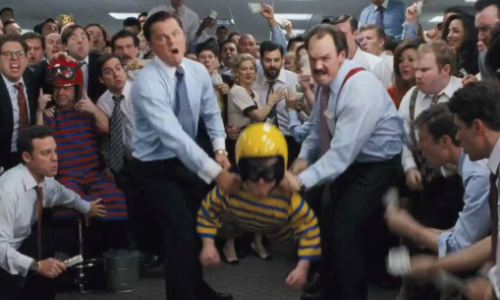Review: The Wolf of Wall Street

The Wolf of Wall Street is a film about awful people doing awful things in a company where being awful paid unbelievable dividends, for a while at least. Thankfully, in the hands of septuagenarian director Martin Scorsese, this doesn’t translate into an awful film; it’s a gloriously dark, joyously intoxicated portrayal of excess, hubris and addiction.
Jordan Belfort (Leonardo DiCaprio) is the eponymous Wolf, a name bestowed upon him in a (real life) hatchet job profile in Forbes magazine. After being fired from his Wall Street firm in the wake of Black Monday, he joins a bargain-basement broking operation housed in a backwater Long Island retail park. Here penny stocks are punted to gullible poor people without the tedious yolk of financial regulation – nobody makes any real money so nobody asks any real questions.
Belfort’s twisted genius is in taking this model out of suburbia and into the heart of New York City, peddling fraudulently inflated shares to the richest men in the country. To achieve this he recruits a braying, ragtag army of hustlers who he whips into a frenzy of greed and testosterone through motivational speeches and class-A drugs.
Addiction inevitably takes hold, with the particular substance largely irrelevant; drugs, sex, money, power, the sound of his own voice. The fug of stimulation rarely lifts for long enough for reality to bite – at least not until it’s far too late.
DiCaprio is on the form of his life, juggling Belfort’s flick-knife sharp salesman shtick with his frothing, raving excesses. It’s the latter that take centre stage – if every scene depicting “Wolfie” snorting cocaine from the intimate regions of a prostitute were cut, the three hour running time would tumble to around seven and a half minutes. One particularly inspired conversation focuses on the legal ramifications of molesting a dwarf who has been hired for staff to throw against a giant dart board.
Trouble in this anti-paradise starts when the firm enters the big leagues, flying too high in all senses of the word. It wins the contract to run the IPO books for shoe designer Steve Madden, but not before Belfort’s Stratton Oakmont has surreptitiously bought 85 per cent of the firm. This is as close as we get to the machinations of Belfort’s fraudulent activity – during his decidedly Henry Hill-esque voiceover, he’s keen to gloss over the details in favour of anecdotes about crashing helicopters and trashing hotels.
Does The Wolf of Wall Street glamourise a malign, criminal enterprise (a charge that’s dominated its reception, especially in light of its Oscar nods)? Yes: it makes working for Stratton Oakmont look like a hoot. It’s a glimpse into a pre-recession world of unlimited wealth and unfettered consumption – a rich smoothie of sex, drugs and dwarf tossing – of course it looks glamorous, that’s the point.
Like Scorsese’s 1990 gangster epic Goodfellas – the most obvious parallel in the director’s canon – The Wolf of Wall Street deals with the corruption of the American dream. During one rabble-rousing speech Belfort bellows: “I want you to deal with your problems by becoming rich… Stratton is America… this is Ellis Island”. But Scorsese is at pains to avoid getting bogged down with moralising. Stealing from people is bad – you shouldn’t need a film to tell you that. What he’s created is far more than a hatchet job on the financial industry: it’s a slick, impeccably paced, grimly hilarious drama, and it’s his best work in years.
First published in City A.M.

